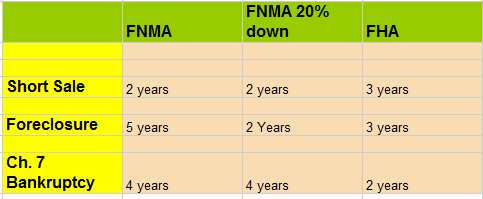 I’ve had several buy closings in the last few weeks and it’s surprising to see how much closing costs have increased since the new Good Faith Estimate (GFE) rules began in January 2010.
I’ve had several buy closings in the last few weeks and it’s surprising to see how much closing costs have increased since the new Good Faith Estimate (GFE) rules began in January 2010.
It used to be that all lenders charged several “garbage can charges” (my cracker barrel, semi-derogatory term for excessive closing costs) on the RESPA.
In the old days, common charges were a tax service fee of $70, flood plain check fee of $29 and some sort of document preparation fee of $200 or so. Standard, non-gouging garbage can charges usually added up to about $300. There were exceptions to this and many times we would see ridiculous add-ons like “table funding fee” and “loan administration fee” from $300 to $1200.00.
When the new GFE law started, all the garbage can charges were bundled into one “Loan Origination Charge” on line 803 of the RESPA closing statement. The charges are no longer broken down separately, but all appear as one lump sum. Buyers have no control over title charges and the other costs on the RESPA. Line 803 is really the only item that a buyer can control. But, Line 803 costs have risen over the last year, mostly because buyers don’t questions the cost. Here is a summary of what I have seen over my last few closings:
1. Buy of Rolling Meadows foreclosure Origination charge $1749.00
2. By owner buy of Palatine condo Origination charge $1295.00
3. Buy of Northbrook home Orgination charge $1580.00
4. Buy of Carpentersville foreclosure Origination charge $3131.00
5. Buy of Palatine home Origination charge $650.00
If I were buying a home, I don’t think I would pay more than about $600 for origination fees. I have no idea why origination charges have become so inflated. The average of the above five closings is over $1600.00 and I think that is way too high. There is no reason or purpose for these charges other than extra income for the lender. (Note: If your lender is a mortgage broker, there is a complex interplay of the “yield spread” paid to a mortgage broker from the underlying lender into the line 803 costs, but in the risk of boring you to tears, I’m not going to torture you with an explanation of that here. But, it’s not the yield spread that is making these costs higher.)
Closing number 4 above is a case of classic overcharging with a whopping $3131.00 origination fee. I always suggest that clients send me the GFE to review before they go ahead with the loan. My clients did not send it to me in that case. The first time I saw it was at the closing. The loan officer told them it was his “standard charge on an FHA mortgage.” Being trusting souls, they agreed to the overcharge and the lender made an extra $2k. FHA places no limit on how much can be charged for an origination charge. It is strictly up to the lender to charge what they want on an FHA and it is negotiable.
So if you are refinancing or buying, beware of the origination charge and try not to pay more than $600.00.



